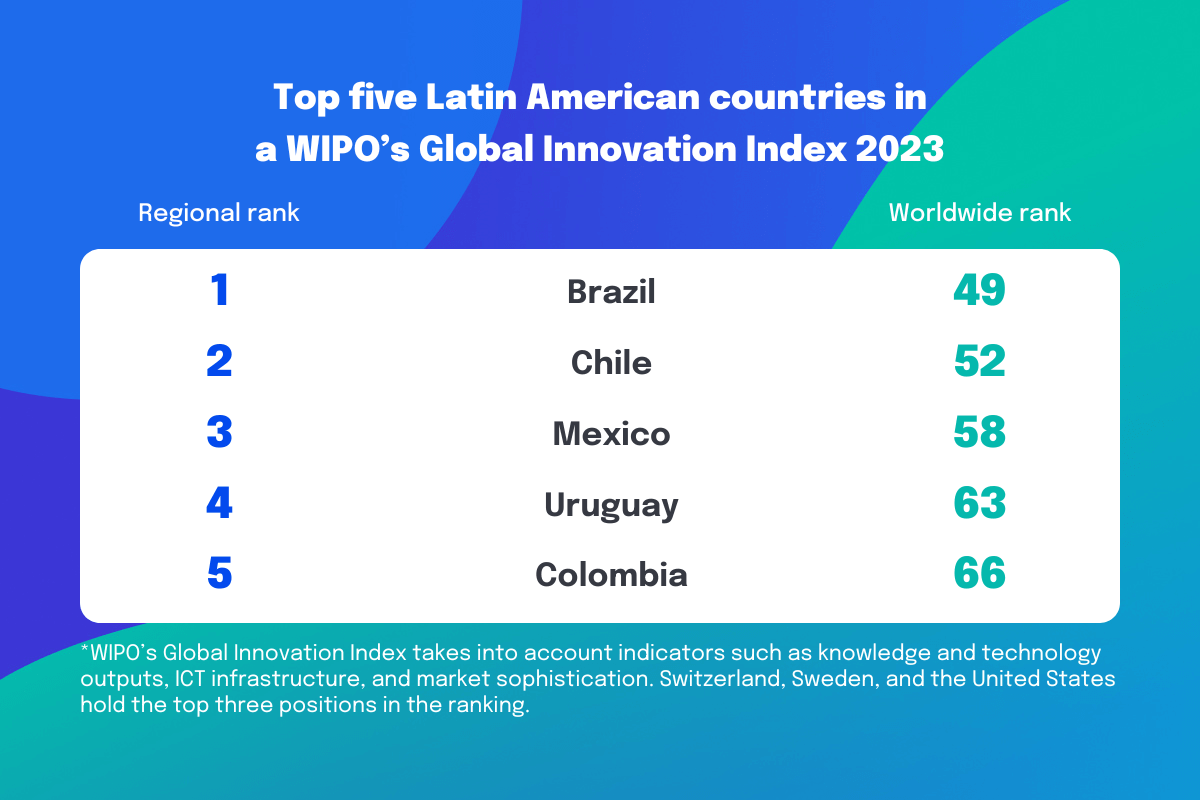Latin American software engineers are well-educated, reliable for long-term cooperation, and have lower rates compared to developers from the United States and Canada. Many of these engineers are involved in offshore development and have hands-on experience building products for other companies.
For this article, we’ve compiled a list of the best outsourcing destinations in the LATAM region. As you begin your contractor hiring journey, you may want to learn about the leading schools or regions that are considered the local Silicon Valley.
Consider our article as an introduction to finding the best talent in the region as we uncover more details about each country, highlighting famous universities that teach computer science, and revealing the cities where innovation thrives the most.
At the end of the article you will also find the average hourly rates for Latin American software developers working in outsourcing agencies.
“I can attest that Latin America is increasingly becoming a key market for software development talent. We’ve found that this region offers high-quality talents at reasonable costs, often including developers who already have experience working directly with the US software product companies and understand their context and cultural nuances. The time zone alignment also allows for a reasonable overlap with our clients’ in-house teams. Since fully embracing this market in 2021, we’ve observed that nearly half of our successful deals are now closed for this region.”
Rita Bodnarchuk, CEO at YouTeam
Table of Contents
How did we choose the top countries for software development outsourcing in Latin America?
First of all, we looked at the top five Latin American countries in a WIPO’s Global Innovation Index 2023, comprising criteria such as human capital and research, infrastructure, knowledge and technology outputs, and business sophistication.
Other parameters that affected the selection included:
- The number of software engineers involved in offshore development.
- Availability of prestigious universities offering engineering and technology careers.
- Career readiness and skills in areas such as computer programming, database management, and data science.
- Hosting some of Latin America’s most valued unicorns.
We chose Brazil, Chile, Mexico, Uruguay, and Colombia as your prime destinations for outsourcing to Latin America. These countries are home to some of the most competitive universities with computer science programs and are known for their vibrant tech communities, strong economies, and thriving startup culture.
Brazil
Brazil has become the most promising technology epicenter in South America. The valuation of its 16 unicorn companies represented 1.9 percent of its GDP in 2023. The country also excels in indicators including government’s online service and intangible assets, ranking well worldwide for its trademarks, and its global brands value.
Brazil is home to a large number of both domestic and international software companies, having a well-educated and experienced workforce. However, the country also faces challenges such as high taxes and a complex regulatory environment, making it difficult for companies to open local branch offices. Finding a reliable outsourcing partner that handles all local compliance and legal support can be a way out to tap into the country’s breadth of engineering talent.
Brazil is well known for its tech talent pool, with more than 7,000 companies in the software development and production sector and more than 12,000 companies registered in the IT services segment as of 2021. WIth 500,000 software developers involved in offshore development in Brazil, the country emerges as one of the global players in outsourcing.
Brazilian tech talent is highly valued as knowledge absorbers who are constantly improving their skills. According to Cousera’s Global Skills Report 2023, learners in Brazil score exceptionally highly in data science and technology skills, ranking 1st in data visualization score and having similarly high scores in data management, data analysis, and statistical programming. In technology skills, learners lead the world in databases while also earning high scores in computer programming and mobile development.
The country is also home to some of the most prestigious universities offering engineering and technology careers, such as the University of São Paulo and State University of Campinas. Both are located in the state of São Paulo, an economic powerhouse that is wealthier than Argentina, Uruguay, Paraguay and Bolivia combined, as reported in 2016.
The University of São Paulo is the largest Brazilian public university and it offers future technology gurus programs such as Applied Computing, Computer Science and Computational Mathematics, Statistics, and Information Systems. State University of Campinas, also known as Unicamp, offers programs in Computer Science, Computer Engineering, Statistics, and Computational Intelligence.
The Campinas Metropolitan Region is home to many national and international high-tech industries and IT companies, including IBM, Dell, Motorola, NXP, Lucent, Nortel, Compaq, Celestica, Samsung, and Texas Instruments. The region also boasts the largest number of high-tech business incubators and industrial parks, such as the CIATEC I and II, Softex, TechnoPark, InCamp, Polis, TechTown, and Industrial Park of Campinas. That makes the region an appealing choice for both investment companies and tech businesses looking for quality talent.
Learn more about the most crucial benefits and challenges of hiring IT professionals in Brazil by reading our blog, “6 Reasons for Outsourcing Software Development to Brazil.”
Mexico
We commonly hear from the news that Mexico–United States relations are strained by illegal immigration and the trade of weapons. Despite this, the country remains one of the United States’ closest and most valued partners, having developed rich diplomatic, economic, and people-to-people ties. Mexico has an advantage for U.S. companies due to its proximity and bilateral trade agreements.
In addition to a favorable business climate and policies that encourage foreign investment, the country attracts foreign companies due to lower developer rates.
For these reasons, Mexican software developers are the most likely of all engineers in the LATAM region to be hired by U.S. companies.
Some companies choose to open branch offices and research facilities in the country. A notable example is Oracle, which opened its development center in Guadalajara, Mexico’s Silicon Valley, back in 2010.
An alternative option to hire Mexican developers is through binational outsourcing agencies or marketplaces, nearshoring development, design, QA, and data analysis for the U.S. customers. According to Statista, the country has around 225,000 engineers involved in software development outsourcing.
Mexico City is one of the world’s biggest middle-income economy science and technology clusters as defined by WIPO. The heart of the country’s startup scene, Mexico City is the birthplace of the first Mexican unicorn, Kavak. An online marketplace for used cars is now worth $8.7 billion, having been named as the leading unicorn company based on market value in Latin America in 2023.
Technical education is one of the country’s primary strongholds. The capital’s National Autonomous University of Mexico (UNAM) is famous because all Mexican Nobel laureates are alumni or faculty of UNAM. The Faculty of Sciences is one of the biggest research complexes of the university, offering bachelor’s degrees in Applied Mathematics, Mathematics, and Computer Science, and graduate programs on Computer Science, Mathematics, and Statistics.
The Monterrey Institute of Technology and Higher Education (ITESM), located in the power city of Monterrey, offers some of its academic programs as joint degrees or in partnership with foreign universities. For instance, its Master of Science in Information Technology is offered as a joint degree with Carnegie Mellon University, while the Bachelor of Science in Industrial Engineering is offered in partnership with the Université de Technologie de Troyes in France and with Université Laval in Quebec, Canada.
According to Coursera, Mexico ranks 2nd in overall skill proficiency in LATAM. Moreover, Mexican tech learners rank 4th in the world for technology skills, with cutting-edge scores in theoretical computer science, computer networking, databases, and operating systems. Data science is another area of strength, with high scores in data analysis, data management, and statistical programming.
Learn advanced tips for hiring contract engineers in Mexico: Read our blog “6 Reasons for Outsourcing Software Development to Mexico.”
Chile
In 2023, Chile has become the second most innovative economy in Latin America and the Caribbean, relinquishing the top position to Brazil. It demonstrated strength in indicators such as expenditure on education, government online services, intellectual property payments, and software spending.
One of the recent trends in Chile is the shift towards nearshoring software development to neighboring countries such as Peru and Colombia. However, Chile’s stable political environment, business-oriented policies, strong education system, and highly skilled technical workforce have made it an attractive outsourcing destination for U.S. companies as well.
Its talent pool comprises 61,000 software developers working on offshore projects. Outsourcing is the largest contributor to the IT services market with a projected market size of $0.58 billion in 2023. Overall, the IT services market revenue in Chile will reach $1.70 billion in 2023.
Tech education in Chile focuses on research, innovation and inclusion. Two Chilean universities have ranked in the QS World University Rankings in 2023 – Pontifical Catholic University of Chile and the University of Chile. The latter is the oldest and the most important university in the country, revered for its leadership and innovation in science, technology, social sciences, and arts. The University of Chile is also famous for being the place where the first woman in the country and South America received her higher education: Eloisa Díaz graduated as a doctor in 1887.
Chile also leads the Human Development Index (HDI) in Latin America, a score measuring basic dimensions of human development—a long and healthy life, knowledge, and a decent standard of living. The country ranks 42nd with a “very high” human development, followed by Argentina, Costa Rica, Uruguay, and Panama.
Coursera research shows that tech learners in Chile have exceptionally high scores in technology skills like computer programming and cloud computing, and data science skills including statistical programming, data analysis, data management, and data visualization.
Deep dive into the specifics of hiring engineers in Chile: Read our blog “6 Reasons for Outsourcing Software Development to Chile.”
Uruguay
Uruguay may be one of the smallest countries in the LATAM region with a limited pool of tech professionals, but the quality of talent is influenced by its democratic initiatives, political stability, and strong technology sector.
The country’s government has policies in place to encourage innovation, such as tax incentives and start-up funding. In addition, a high literacy rate and a robust education system are producing software engineers who are ready to take on challenging roles and projects.
The country’s tech development initiatives focus on software industry growth and knowledge flow between universities, research facilities, businesses, and markets. Uruguay is home to Pando Science and Technology Park, which works with companies to improve their products and processes, promoting the training of human talent.
The Uruguay Innovation Hub offers an acceleration program for technology-based ventures, attracting regional investors and venture capital funds to support investment in startups. One of the open laboratories available within its framework is the AI & IoT Insider Microsoft Lab that allows engineering teams to work directly with dedicated Microsoft AI & IoT technology experts, helping businesses digitally transform their products and services.
In the Global Innovation Index 2023, Uruguay leads in the top 10 for policies for doing business (4th), ICT services imports (5th) and exports (7th), and operational stability for businesses (10th).
Uruguay is ranked first in the Americas for democracy, with high income per capita, a low level of inequality, and the almost complete absence of extreme poverty. Compared to other countries in the Americas, its middle class is the largest and represents more than 60% of its population.
According to the World Bank, Uruguay has the highest rate of political stability and the absence of violence and terrorism in the LATAM region. The country’s current political stability score is 1.1 (for reference, the United States score is 0.0, and the United Kingdom’s is 0.5).
Learn how Uruguay’s high literacy rate, focus on education, and growing infrastructure capacity make it an attractive choice for outsourcing software development.
Colombia
The country is home to a large population of tech-savvy young people, and the government is actively promoting the software industry through tax incentives and infrastructure investments. The IT services market in Colombia is surrounded by the growing popularity of outsourcing.
The country shows strength in such indicators as intellectual property payments, high-tech imports, and labor productivity growth. The Colombian on-demand delivery platform, Rappi, is the second most valued unicorn in Latin America, with a market value of $5.25 billion. Founded in 2015, by 2020 Rappi was operating in nine countries in the region.
Technology is the strongest skill domain for Colombian learners. The country ranks 2nd in LATAM and 6th globally for tech skills like operating systems, computer networking, and programming. Colombian learners also achieve high scores in mathematics, data analysis, and statistical programming.
The University of the Andes and the National University of Colombia are among the most selective and competitive universities in the country, ranking in the top 10 in Latin America according to the QS World University Rankings in 2023. The latter was the first university in Colombia to open a computer science postgraduate program in 1967.
Discover more about Colombia’s work culture, driven by an enthusiastic approach to problem-solving. Read our blog “6 Reasons for Outsourcing Software Development to Colombia.”
What are software developer rates in Latin America
The following figures represent the average hourly rates for software developers registered on the YouTeam platform. We selected mid-level, senior, and architect software engineers who listed the following programming languages or frameworks as the core technology in their profiles.
| .NET | Java | Python | JavaScript | Ruby on Rails | Kotlin | |
| Brazil | $50 | $52 | $51 | $50 | $51 | $58 |
| Mexico | $52 | $51 | $53 | $51 | $57 | $50 |
| Chile | $53 | $51 | $61 | $54 | $57 | $49 |
| Uruguay | $60 | $60 | $60 | $58 | $56 | $69 |
| Colombia | $53 | $51 | $54 | $51 | $54 | $55 |
Source: YouTeam
Visit YouRate to discover the most likely talent rates at software development companies in 35 countries in Latin America and Europe, filtered by location, tech stack, and years of experience.
Final thoughts
Choosing to outsource to Latin America gives you access to highly educated, product-oriented talent, most often fluent in English. We hope you now have a better understanding of the top countries in the region to find reliable and experienced software talent. With a significant number of engineers involved in offshore software development, these countries stand out as technological powerhouses with world-renowned universities, research centers and government policies that support business and innovation.







